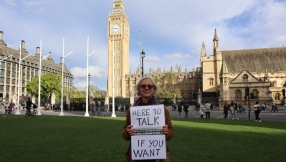
Criticising someone's choice of Bible reading at a wedding is like criticising the bride's dress or the groom's haircut. Whatever your private opinion, the rule is: it's all lovely.
So having 1 Corinthians 13 at a wedding is lovely. Love is patient, love is kind, it does not envy, it does not boast, etc. Beautiful words for a beautiful day – what could be nicer?
Well, the problem is – and I write this in the same fear and trembling as the chap who had to put his hand into the Wood Beast's lair in Flash Gordon – the Bible doesn't really do "nice". And I worry that Paul's sublime, God-breathed words in 1 Corinthians have been co-opted and corrupted by a wedding industry that celebrates romantic love, which is all about hormones, at the expense of Christian love, which is all about commitment.
Paul's "Love is..." list isn't a statement of the dewy-eyed emotional state in which couples stand in front of the altar. It's a commitment to a rigorous practice of spiritual discipline in relation to other people in general – and not just to the object of amorous desire.
Yes, it's lovely. But I'm not sure that attaching it to the wedding service does it justice. So here are some alternatives.
1. Ecclesiastes 4:9-12: "Two are better than one, because they have a good reward for their toil. For if they fall, one will lift up his fellow. But woe to him who is alone when he falls and has not another to lift him up! Again, if two lie together, they keep warm, but how can one keep warm alone? And though a man might prevail against one who is alone, two will withstand him—a threefold cord is not quickly broken."
These verses speak of help, companionship and mutual support. A strong marriage armours people against life's slings and arrows.
2. Ruth 1:16-17: "But Ruth said, 'Do not urge me to leave you or to return from following you. For where you go I will go, and where you lodge I will lodge. Your people shall be my people, and your God my God. Where you die I will die, and there will I be buried. May the LORD do so to me and more also if anything but death parts me from you.'"
The widowed Ruth is talking to her mother-in-law Naomi, but these are wonderful wedding words. In Christian marriage a couple shares everything.
3. Matthew 19:4-6 "[Jesus] answered, "Have you not read that he who created them from the beginning made them male and female, and said, 'Therefore a man shall leave his father and his mother and hold fast to his wife, and the two shall become one flesh'? So they are no longer two but one flesh. What therefore God has joined together, let not man separate."
In marriage a new family is created, Jesus says. Of course the wider family is important, but the new couple needs to find its own identity, free from interference by their elders.
4. Ephesians 3: 14-19: "For this reason I kneel before the Father, from whom every familyin heaven and on earth derives its name. I pray that out of his glorious riches he may strengthen you with power through his Spirit in your inner being, so that Christ may dwell in your hearts through faith. And I pray that you, being rooted and established in love, may have power, together with all the Lord's holy people, to grasp how wide and long and high and deep is the love of Christ, and to know this love that surpasses knowledge – that you may be filled to the measure of all the fullness of God."
The idea here is that every family is modelled on the relationship of God with his people. In Paul's prayer that Christians know God and be filled with his "fullness", he is asking a blessing on families too.
5. Romans 12: 9-21: "Love must be sincere. Hate what is evil; cling to what is good. Be devoted to one another in brotherly love. Honour one another above yourselves. Never be lacking in zeal, but keep your spiritual fervour, serving the Lord. Be joyful in hope, patient in affliction, faithful in prayer. Share with God's people who are in need. Practise hospitality. Bless those who persecute you; bless and do not curse. Rejoice with those who rejoice; mourn with those who mourn. Live in harmony with one another. Do not be proud, but be willing to associate with people of low position. Do not be conceited.
"Do not repay anyone evil for evil. Be careful to do what is right in the eyes of everybody. If it is possible, as far as it depends on you, live at peace with everyone. Do not take revenge, my friends, but leave room for God's wrath, for it is written: 'It is mine to avenge; I will repay,' says the Lord. On the contrary: 'If your enemy is hungry, feed him; if he is thirsty, give him something to drink. In doing this, you will heap burning coals on his head.' Do not be overcome by evil, but overcome evil with good."
There's much wisdom here, not just for the Christian community generally – which Paul has mainly in mind – but for married people too. Fundamentally, this passage is about treating people with respect, which is one of the cornerstones of marriage.









